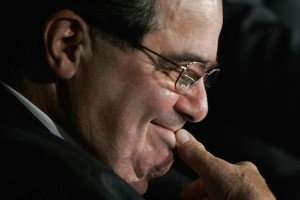You don’t have to be Catholic to be fully sane, but it helps. I’ve been thinking this since hearing the news of Antonin Scalia’s death.
I admired him long before I became a Roman Catholic myself, and much of what I admired had to do with his religious formation. He was anchored, grounded, sure of himself, in a way that excluded arrogance. He knew which way was up, and which down. He could not be intimidated.
Yet all of this is possible without being Catholic. I have met, for instance, Dutch Reform and Scotch Presbyterian characters with the qualities in this “matrix.” And found those and others to be broadly generous – free from factional bigotry, or conversely, open to the entire heritage of Christianity and “whatsoever things are true,” modest, just, holy, lovely, of good report.
I have, in my sometime capacity as hack journalist, had the honor of interviewing religious leaders from the Grand Sheikh of Al Azhar in Cairo to the Supreme Patriarch of the Sangha in Thailand – who also struck me as anchored, grounded, solid, and sure of a moral order proceeding from a Love that is anything but fluffy.
If course, I have met Catholics who were narrow and grim, loveless and cruel. The Word becomes just words when the spirit is evacuated; and words can be turned to wicked effect when a grounding faith is exchanged for something else.
Here I run the risk of sounding like a liberal. Lord, I am not. Nor do I intend to take an “ecumenical holiday” from the divine call of the battlefield: to hold one’s trench in the war with Satan. I am only affirming that men are formed, or malformed, in good or evil traditions, and to approach a good man is to respect his good traditions.
Scalia could understand this. He was aware that America was in its founding a Protestant estate; that the American Constitution he defended was in its nature a fine but finite thing, and he not sitting on the Roman Rota.
Many of his more learned Catholic friends disputed with him – always pleasantly, so far as I’m aware – on the question of the “natural law” on which that “positive” constitution could be said to rest. Scalia wouldn’t go there, in any public way. In his American mind there was a very strict separation between Church and State, and he was neither politician nor philosopher.
What good he could do was serving the Court, and applying the Law, as written. He did not even think it was meant as a Constitutional Court (such as the several that exist in Europe). It was simply the court of last appeal in the United States: the backstop against judicial error in the lower courts. This backstop could have no “agenda.”
As a Catholic, for instance, he was profoundly opposed to abortion. His good wife, Maureen, mother of nine, played an active and untiring role in the struggle against this monstrous horror, which cries for justice even to Heaven. Scalia was more than once taxed for his wife’s activities as a private citizen, with the suggestion he should recuse himself – along, perhaps, with all the other Catholics on the high bench – from any case with moral implications.
This was ridiculously unfair. Scalia’s position was that of a lawyer. There is demonstrably no “woman’s right to an abortion” in the U.S. Constitution. Roe v. Wade wrote it in, fancifully, and by so doing, arrogated to the judiciary an unmistakably legislative power. Scalia, as lawyer and judge, did not oppose on purely moral grounds; he would invoke nothing beyond the laws as written.
America could have abortion if it wanted; could have gay marriage and “euthanasia” and any other wrong it chose, through lawful legislative acts at appropriate state or federal levels. These things could even be written into the Constitution by the formal passage of an Amendment. But until they were, they could not be legitimately imposed by lawyers. Rights were rights in law, and not through an appeal to abstractions, from the Supreme Court down.
Here is the paradox: that Scalia as lawyer meticulously avoided reference to any religious code, any interpretation from some prior “natural law” – though he was himself an extremely observant Catholic. Whereas, his “liberal” adversaries on the Court were reckless in finding such things, and reading them into a Constitution that never mentioned them.
They, and not he, could be taken for the proponents of some “natural law” – albeit one that is fatuous in itself, and constantly changing to fit the times.
As Scalia correctly represented, once you can do that, you can do anything. Once it was established that the high lawyers could rewrite laws at whim – and this is just what happened in Roe v. Wade – there were no restraints. Something had been done to American law in that decision, tantamount to what would be done to American babies.
Saint Thomas More took a similar position to Scalia’s with respect to the Laws of England when he was Chancellor. Readers, of a certain age, may recall his position paraphrased in the play, A Man for all Seasons, in response to the “reforming” Roper – the idealist proposing to cut down all laws that stood in the way of his imagined perfect justice:
“Oh? And when the last law was down, and the Devil turned round on you – where would you hide, Roper, the laws all being flat? This country’s planted thick with laws from coast to coast – man’s laws, not God’s – and if you cut them down – and you’re just the man to do it – d’you really think you could stand upright in the winds that would blow then? Yes, I’d give the Devil benefit of law, for my own safety’s sake.”
RIP, Nino Scalia. He didn’t have to be Catholic to uphold this position, so nobly. But it helped.
















